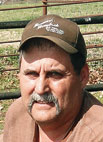 Kenny and Stephanie Kirk are not your typical livestock farmers, meaning that are born and raised with livestock all around them. Rather they were both “townies” and graduated from Springdale High School. However, Kirk was highly involved in FFA and placed second in the state for individual livestock judging. He also worked on farms during high school and looked up to Gene Shockley who had a cow/calf farm and the Parsons family who ran a feeder operation. Kenny said, “The bug bit, and I knew I wanted in.” Kenny knew two things: he wanted to farm and he wanted to live in Madison County.
Kenny and Stephanie Kirk are not your typical livestock farmers, meaning that are born and raised with livestock all around them. Rather they were both “townies” and graduated from Springdale High School. However, Kirk was highly involved in FFA and placed second in the state for individual livestock judging. He also worked on farms during high school and looked up to Gene Shockley who had a cow/calf farm and the Parsons family who ran a feeder operation. Kenny said, “The bug bit, and I knew I wanted in.” Kenny knew two things: he wanted to farm and he wanted to live in Madison County.
The problem, of course, is that farming from scratch presents a huge financial obstacle. Kenny said, “I also love people and checking out the world while my wife is highly child centered.” The result is a lifestyle where Kenny wears many hats. He works as a farm realtor, a field worker and hauler for the Farmers’ Livestock Auction in Springdale, Ark., and as a farm inspector for the First Financial Bank in Fayetteville, Ark., performing inspections to make sure farmers are maintaining the value of their mortgaged property. All of this is in addition to running his own heifer replacement operation on 200 owned and leased acres of hay and cattle ground outside of Hindsville, Ark. Stephanie, on the other hand is a one-year “lunch lady” at Hindsville Elementary and an active mom caring for three children: Jake, 21, Caleb, 16 and Mckenna, 9.
Kenny likes to maintain a herd of 120 Brangus/Angus heifers and 10 registered Angus bulls using live cover because his busy schedule simply has insufficient time for AI. Kenny said, “I know I have more bull power than I need, but I want synchronized production and bull power helps make that possible. I also facilitate synchronization by administering a hormone shot 30 days before turning out my bulls.”
Kenny selects his heifers by appearance looking for a long, black animal with good and heavy bone structure and a docile temperament. Kenny said, “I think the Brangus/Angus cross make the best momma cows in northwest Arkansas because they are the highly desired black color and are both heat and pinkeye resistant.” Kenny selects his bulls by looking at the EPDs, especially in terms of birth weight.
Kenny typically buys his heifers in September or October and sells them 15 months later in January. He culls his heifer herd three times to ensure that he has the best possible calves. He culls just before administering the first round of shots, just after pulling the bulls out, and once more after he preg checks in 100 days. He sells all culled heifers at the Springdale auction. Kenny said, “They have been there for 40 years and have a steady, repeat customer base.”
Kenny treats for shipping fever with all animals as soon as purchased. He also administers two rounds of vaccinations, the first 30 days after purchase and the second 30 days before the bulls are turned out. Kenny believes the biggest current region-wide health issue is trichomoniasis, which he also believes is beginning to be controlled.
The cattle are watered with spring water and ponds. Kenny said, “The drought really hit us hard and cattle numbers are still way down, which means prices are too high to afford replacement heifers and still be able to make money. I had a call just today for someone looking for heifers but I don’t have any to sell right now. Selling is never a problem, and I sell mostly by word-of-mouth and to repeat customers. ”
Kenny’s pasture is fescue, natural grass and bermuda which is fertilized once a year with local chicken litter the first year and nitrogen the second. He also sprays once per year for weeds using a commercial spray in the spring. Kenny sets aside 60 acres for hay and can do two cuttings per year but likes to cut only once in order to reserve the land for grazing. Consequently, Kenny has to buy hay because the land does not produce enough to fill his year long needs.
Kenny and Stephanie are looking forward to an extremely busy year because they are moving into a new house and because both younger children have chosen athletics as their main activity. Nonetheless, cattle are in Kenny’s blood, and he is looking forward to building up his herd again.







